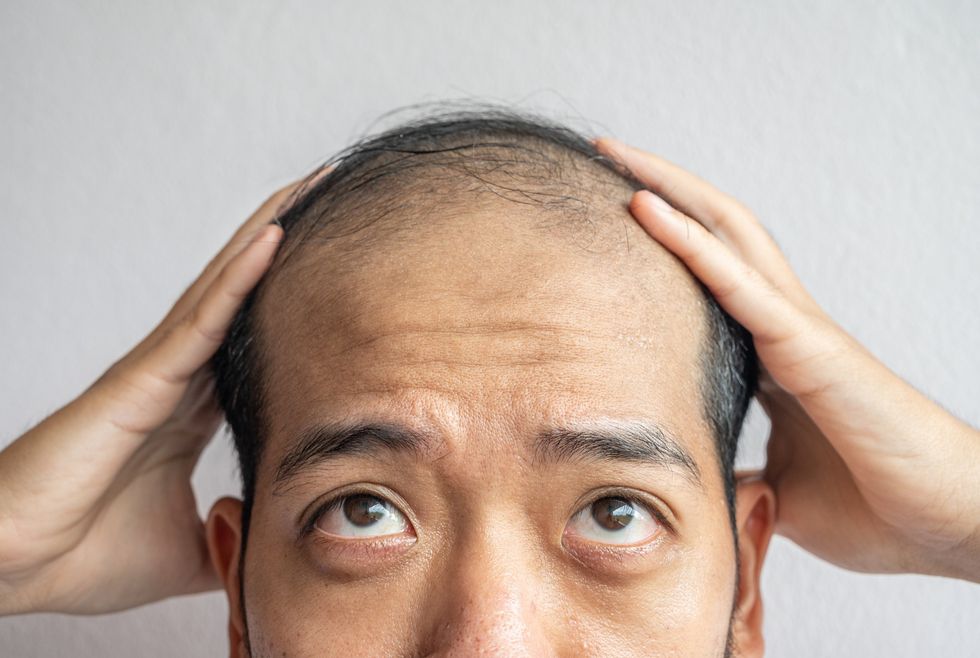Breakthrough drug that reverses hair loss to be rolled out on the NHS
Getty Images
The new treatment, taken as a daily pill at home, works by reducing the enzymes that cause inflammation and subsequent hair loss at the follicle
- Up to 14,000 adults and teenagers could soon get access to the breakthrough drug
- A large study found patients on the drug achieved over 90 percent hair or scalp coverage
- Experts are hailing its approval a 'monumental day' for hair loss sufferers
Don't Miss
Most Read
Trending on GB News
Hair loss is set to become a thing of the past for thousands of Britons after health officials approved a breakthrough drug that's been shown to reverse hair loss in as little as six months.
People with severe alopecia areata can now be prescribed a daily tablet of ritlecitinib (also known as Litfulo), following the decision from the National Institute for Health and Care Excellence (Nice).
The new drug, made by Pfizer, dampens the enzymes that cause inflammation and subsequent hair loss in people suffering from alopecia areata, which is estimated to affect one in every 170 adults in the UK.
Nice says that up to 14,000 people over the age of 12 could soon get access to ritlecitinib on the NHS.

Alopecia areata occurs when the immune system mistakenly attacks hair follicles
GETTY IMAGESIt is the first alopecia treatment Nice has recommended for use on the NHS.
Alopecia areata describes a sudden loss of round or oval patches of hair on the scalp. It occurs when the immune system mistakenly attacks hair follicles.
Researchers do not fully understand what causes the immune attack on hair follicles, but they believe that both genetic and environmental (non-genetic) factors play a role.
Alopecia UK says an effective treatment for the autoimmune disease is long overdue and that the approval of a new drug marks a significant moment.
The charity's chief executive, Sue Schilling, said: “This is a monumental day for the alopecia areata community.
“For far too long, patients with alopecia areata have gone without a licensed treatment option available via NHS pathways.
“If new treatments are only available privately, it becomes a case of the ‘haves and the have nots’, this latest Nice recommendation will go som way to address this.
“Our community still faces substantial barriers including difficulties in getting a dermatology referral from their GP, unacceptable dermatology waiting times, and even some NHS trusts making the decision not to allow dermatology appointments for alopecia patients.
“There is no longer the excuse of there being no licensed treatment available. I urge key decision makers within the NHS to keep referral pathways open for patients with alopecia areata.”
Nice’s appraisal committee initially rejected the drug last year but the health body said it was able to reverse its decision following a public consultation as well as getting more information about the drug and a discount to its price.
As a result it was able to recommend the drug as a “clinically and cost effective” treatment for use in the NHS.
Results from a large study published last year showed that 13 percent of patients achieved 90 percent or more scalp hair coverage after 24 weeks of taking the drug, compared with 1.5 percent of those on a placebo.
Almost half of the those treated with ritlecitinib reported "moderate" to "great" improvement in their hair loss.
On the decision to sign off the drug, Helen Knight, director of medicines evaluation at Nice, said: “Our committee heard how severe alopecia areata can have a significant impact on people’s health and quality of life.
“I’m delighted that we are now able to recommend this innovative treatment, the first time a medicine for severe alopecia areata has been recommended by Nice for use in the NHS.
LATEST DEVELOPMENTS

Up to 14,000 people over the age of 12 could soon get access to ritlecitinib on the NHS
Pexels







